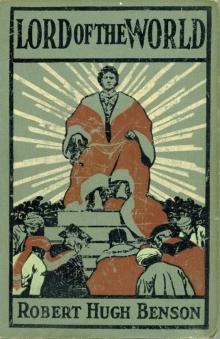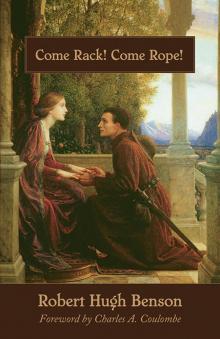- Home
- Robert Hugh Benson
Come Rack, Come Rope Page 10
Come Rack, Come Rope Read online
Page 10
“Madge,” she began, when she had read through the confused line or two, in the half-boyish, half-clerkly hand of Robin, scribbled and dispatched by the hands of Dick scarcely two hours ago. “Madge——”
She was about to say something sensible when the maid interrupted her again.
“And it is I who have brought it all on him!” she wailed. “If it had not been for me——”
Her mother laid a firm hand on her daughter’s mouth. It was not often that she felt the superior of the two; yet here was a time, plain enough, when maturity and experience must take the reins.
“Madge,” she said, “it is plain you do not love him; or you never——”
The maid started back, her eyes ablaze.
“Not love him! Why——”
“That you do not love him truly; or you would never have wished this for him.… Now listen to me, and listen carefully!”
She raised an admonitory finger, complacent at last. But her speech was not to be made at that time; for her daughter swiftly rose to her feet, controlled at last by the shock of astonishment.
“Then I do not think you know what love is,” she said softly. “To love is to wish the other’s highest good, as I understand it.”
Mrs. Manners compressed her lips, as might a prophetess before a prediction. But her daughter was beforehand with her again.
“That is the love of a Christian, at least,” she said. Then she stooped, took the letter from her mother’s knees, and went out.
Mrs. Manners sat for a moment as her daughter left her. Then she understood that her hour of superiority was gone with Marjorie’s hour of weakness; and she emitted a short laugh as she took her place again behind the child she had borne.
II
It was a strange time that Marjorie had until two days later, when Robin came and told her all, and how it had fallen out. For now, it seemed, she walked on air; now in shoes of lead. When she was at her prayers (which was pretty often just now), and at other times, when the air lightened suddenly about her and the burdens of earth were lifted as if another hand were put to them, why, then, all was glory, and she saw Robin as transfigured and herself beneath him all but adoring. Little visions came and went before her imagination. Robin riding, like some knight on an adventure, to do Christ’s work; Robin at the altar, in his vestments; Robin absolving penitents—all in a rosy light of faith and romance. She saw him even on the scaffold, undaunted and resolute, with God’s light on his face, and the crowd awed beneath him; she saw his soul entering heaven, with all the harps ringing to meet him, and eternity begun.… And then, at other times, when the heaviness came down on her, as clouds upon the Derbyshire hills, she understood nothing but that she had lost him; that he was not to be hers, but Another’s; that a loveless and empty life lay before her, and a womanhood that was without its fruition. And it was this latter mood that fell on her, swift and entire, when, looking out from her window a little before dinnertime, she saw suddenly his hat, and Cecily’s head, jerking up the steep path that led to the house.
She fell on her knees by her bedside.
“Jesu!” she cried. “Jesu! Give me strength to meet him.”
Mrs. Manners, too, hearing the horse’s footsteps on the pavement a minute later, and Marjorie’s steps going downstairs, also looked forth and saw him dismounting. She was a prudent woman, and did not stir a finger till she heard the bell ringing in the court for the dinner to be served. They would have time, so she thought, to arrange their attitudes.
And, indeed, she was right: for it was two quiet enough persons who met her as she came down into the hall: Robin flushed with riding, yet wholly under his own command—bright-eyed, and resolute and natural (indeed, it seemed to her that he was more of a man than she had thought him). And her daughter, too, was still and strong; a trifle paler than she should be, yet that was to be expected. At dinner, of course, nothing could be spoken of but the most ordinary affairs—in such speaking, that is, as there was. It was not till they had gone out into the walled garden and sat them down, all three of them, on the long garden-seat beside the rose-beds, that a word was said on these new matters. There was silence as they walked there, and silence as they sat down.
“Tell her, Robin,” said the maid.
It appeared that matters were not yet as wholly decided as Mrs. Manners had thought. Indeed, it seemed to her that they were not decided at all. Robin had written to Dr. Allen, and had found means to convey his letter to Mr. Simpson, who, in his turn, had undertaken to forward it at least as far as to London; and there it would await a messenger to Douay. It might be a month before it would reach Douay, and it might be three or four months, or even more, before an answer could come back. Next, the squire had taken a course of action which, plainly, had disconcerted the lad, though it had its conveniences too. For, instead of increasing the old man’s fury, the news his son had given him had had a contrary effect. He had seemed all shaken, said Robin; he had spoken to him quietly, holding in the anger that surely must be there, the boy thought, without difficulty. And the upshot of it was that no more had been said as to Robin’s leaving Matstead for the present—not one word even about the fines. It seemed almost as if the old man had been trying how far he could push his son, and had recoiled when he had learned the effect of his pushing.
“I think he is frightened,” said the lad gravely. “He had never thought that I could be a priest.”
Mrs. Manners considered this in silence.
“And it may be autumn before Dr. Allen’s letter comes back?” she asked presently.
Robin said that that was so.
“It may even be till winter,” he said. “The talk among the priests, Mr. Simpson tells me, is all about the removal from Douay. It may be made at any time, and who knows where they will go?”
Mrs. Manners glanced across at her daughter, who sat motionless, with her hands clasped. Then she was filled with the spirit of reasonableness and sense: all this tragic to-do about what might never happen seemed to her the height of folly.
“Nay, then,” she burst out, “then nothing may happen after all. Dr. Allen may say ‘No;’ the letter may never get to him. It may be that you will forget all this in a month or two.”
Robin turned his face slowly towards her, and she saw that she had spoken at random. Again, too, it struck her attention that his manner seemed a little changed. It was graver than that to which she was accustomed.
“I shall not forget it,” he said softly. “And Dr. Allen will get the letter. Or, if not he, someone else.”
There was silence again, but Mrs. Manners heard her daughter draw a long breath.
III
It was an hour later that Marjorie found herself able to say that which she knew must be said.
Robin had lingered on, talking of this and that, though he had said half a dozen times that he must be getting homewards; and at last, when he rose, Mistress Manners, who was still wholly misconceiving the situation, after the manner of sensible middle-aged folk, archly and tactfully took her leave and disappeared down towards the house, advancing some domestic reason for her departure.
Robin sighed, and turned to the girl, who still sat quiet. But as he turned she lifted her eyes to him swiftly.
“Good-bye, Mr. Robin,” she said.
He pulled himself up.
“You understand, do you not?” she said. “You are to be a priest. You must remember that always. You are a sort of student already.”
She could see him pale a little; his lips tightened. For a moment he said nothing; he was taken wholly aback.
“Then I am not to come here again?”
Marjorie stood up. She showed no sign of the fierce self-control she was using.
“Why, yes,” she said. “Come as you would come to any Catholic neighbours. But no more than that.… You are to be a priest.”
The spring air was full of softness and sweetness as they stood there. The whole world, it seemed, was kindling with love and freshness.
Yet these two had to stand here and be cold, one to the other.… He was to be a priest; that must not be forgotten, and they must meet no more on the old footing. That was gone. Already he stood among the Levites, at least in intention; and the Lord alone was to be the portion of his inheritance and his Cup.
It was a minute before either of them moved, and during that minute the maid felt her courage ebb from her like an outgoing tide, leaving a desolation behind. It was all that she could do not to cry out.
But when at last Robin made a movement and she had to look him in the face, what she saw there braced and strengthened her.
“You are right, Mistress Marjorie,” he said both gravely and kindly. “I will bid you good-day and be getting to my horse.”
He kissed her gently, as the manner was, and went down the path alone.
PART II
CHAPTER I
I
IT WAS with a sudden leap of her heart that Marjorie, looking out of her window at the late autumn landscape, her mind still running on the sheet of paper that lay before her, saw a capped head, and then a horse’s crest, rise over the broken edge of land up which Robin had ridden so often two and three years ago. Then she saw who was the rider, and laid her pen down again.
It was two years since the lad had gone to Rheims, and it would be five years more, she knew (since he was not over quick at his books), before he would return a priest. She had letters from him: one would come now and again, a month or two sometimes after the date of writing. It was only in September that she had had the letter which he had written her on hearing of her father’s death, and Mr. Manners had died in June. She had written back to him then, a discreet and modest letter enough, telling him of how Mr. Simpson had read Mass over the body before it was taken down to Derby for the burying; and telling him, too, of her mother’s rheumatics that kept her abed now three parts of the year. For the rest, the letters were dull enough reading to one who did not understand them: the news the lad had to give was of a kind that must be disguised, lest the letters should fall into other hands, since it concerned the coming and going of priests whose names must not appear. Yet, for all that, the letters were laid up in a press, and the heap grew slowly.
It was Mr. Anthony Babington who was come now to see her, and it was his third visit since the summer. But she knew well enough what he was come for, since his young wife, whom he had married last year, was no use to him in such matters: she had lately had a child, too, and lived quietly at Dethick with her women. His letters, too, would come at intervals, carried by a rider, or sometimes some farmer’s man on his way home from Derby, and these letters, too, held dull reading enough for such as were not in the secret. Yet the magistrates at Derby would have given a good sum if they could have intercepted and understood them.
It was in the upper parlour now that she received him. A fire was burning there, as it had burned so long ago, when Robin found her fresh from her linen, and Anthony sat down in the same place. She sat by the window, with the paper in her hands at which she had been writing when she first saw him.
He had news for her, of two kinds, and, like a man, gave her first that which she least wished to hear. (She had first showed him the paper.)
“That was the very matter I was come about,” he said. “You have only a few of the names, I see. Now the rest will be over before Christmas, and will all be in London together.”
“Can you not give me the names?” she said.
“I could give you the names, certainly. And I will do so before I leave; I have them here. But—Mistress Marjorie, could you not come to London with me? It would ease the case very much.”
“Why, I could not,” she said. “My mother——And what good would it serve?”
“This is how the matter stands,” said Anthony, crossing his legs. “We have a dozen priests coming all together—at least, they will not travel together, of course; but they will all reach London before Christmas, and there they will hold counsel as to who shall go to the districts. Eight of them, I have no doubt, will come to the north. There are as many priests in the south as are safe at the present time—or as are needed. Now if you were to come with me, mistress—with a serving-maid, and my sister would be with us—we could meet these priests, and speak with them, and make their acquaintance. That would remove a great deal of danger. We must not have that affair again which fell out last month.”
Marjorie nodded slowly. (It was wonderful how her gravity had grown on her these last two years.)
She knew well enough what he meant. It was the affair of the clerk who had come from Derby on a matter connected with her father’s will about the time she was looking for the arrival of a strange priest, and who had been so mistaken by her. Fortunately he had been a well-disposed man, with Catholic sympathies, or grave trouble might have followed. But this proposal of a visit to London seemed to her impossible. She had never been to London in her life; it appeared to her as might a voyage to the moon. Derby seemed oppressingly large and noisy and dangerous; and Derby, she understood, was scarcely more than a village compared to London.
“I could not do it,” she said presently. “I could not leave my mother.”
Anthony explained further.
It was evident that Booth’s Edge was becoming more and more a harbour for priests, owing largely to Mistress Marjorie’s courage and piety. It was well placed; it was remote; and it had so far avoided all suspicion. Padley certainly served for many, but Padley was nearer the main road; and besides, had fallen under the misfortune of losing its master for the very crime of recusancy. It seemed to be all important, therefore, that the ruling mistress of Booth’s Edge, since there was no master, should meet as many priests as possible, in order that she might both know and be known by them; and here was such an opportunity as would not easily occur again. Here were a dozen priests, all to be together at one time; and of these, at least two-thirds would be soon in the north. How convenient, therefore, it would be if their future hostess could but meet them, learn their plans, and perhaps aid them by her counsel.
But she shook her head resolutely.
“I cannot do it,” she said.
Anthony made a little gesture of resignation. But, indeed, he had scarcely hoped to persuade her. He knew it was a formidable thing to ask of a countrybred maid.
“Then we must do as well as we can,” he said. “In any case, I must go. There is a priest I have to meet in any case; he is returning as soon as he has bestowed the rest.”
“Yes?”
“His name is Ballard. He is known as Fortescue, and passes himself off as a captain. You would never know him for a priest.”
“He is returning, you say?”
A shade of embarrassment passed over the young man’s face, and Marjorie saw that there was something behind which she was not to know.
“Yes,” he said, “I have business with him. He is not to come over on the mission yet, but only to bring the others and see them safe——”
He broke off suddenly.
“Why, I was forgetting,” he cried. “Our Robin is coming too. Just to-day I had a letter from him, and another for you.”
He searched in the breast of his coat, and did not see the sudden rigidity that fell on the girl. For a moment she sat perfectly still; her heart had leapt to her throat, it seemed, and was hammering there.… But by the time he had found the letter she was herself again.
“Here it is,” he said.
She took it; but made no movement to open it.
“But he is not to be a priest for five years yet?” she said quietly.
“No; but they send them sometimes as servants and such like, to make a party seem what it is not, as well as to learn how to avoid her Grace’s servants. He will go back with Mr. Ballard, I think, after three or four weeks. You have had letters from him, you told me?”
She nodded.
“Yes; but he said nothing of it, but only how much he longed to see England again.”
“He could not. It h
as only just been arranged. He has asked to go.”
There was a silence for a moment. But Anthony did not understand what it meant. He had known nothing of the affair of his friend and this girl, and he looked upon them merely as a pair of acquaintances, above all, when he had heard of Robin’s determination to go to Rheims. Even the girl saw that he knew nothing, in spite of her embarrassment, and the thought that had come to her when she had heard of Robin’s coming to London grew on her every moment. But she thought she must gain time.
She stood up.
“You would like to see his letters?” she asked. “I will bring them.”
And she slipped out of the room.
II
Anthony Babington sat still. It was true that he was sincere and active enough in all that he did up here in the north for the priests of his faith; indeed, he risked both property and liberty on their behalf, and was willing to continue doing so as long as these were left to him. But it seemed to him sometimes that too much was done by spiritual ways and too little by temporal. Certainly the priesthood and the Mass were instruments—and, indeed, the highest instruments in God’s hand; it was necessary to pray and receive the sacraments, and to run every risk in life for these purposes. Yet it appeared to him that the highest instruments were not always the best for such rough work.
It was now over two years ago since the thought had first come to him, and since that time he had spared no effort to shape a certain other weapon, which, he thought, would do the business straight and clean. Yet how difficult it had been to raise any feeling on the point. At first he had spoken almost freely to this or that Catholic whom he could trust; he had endeavoured to win even Robin; and yet, with hardly an exception, all had drawn back and bidden him be content with a spiritual warfare. One priest, indeed, had gone so far as to tell him that he was on dangerous ground … and the one and single man who up to the present had seemed on his side was the very man, Mr. Ballard, then a layman, whom he had met by chance in London, and who had been the occasion of first suggesting any such idea. It was, in fact, for the sake of meeting Ballard again that he was going to London; and, he had almost thought from his friend’s last letter, it had seemed that it was for the sake of meeting him that Mr. Ballard was coming across once more.

 The Dawn of All
The Dawn of All By What Authority?
By What Authority? The King's Achievement
The King's Achievement Lord of the World
Lord of the World The History of Richard Raynal, Solitary
The History of Richard Raynal, Solitary Come Rack, Come Rope
Come Rack, Come Rope